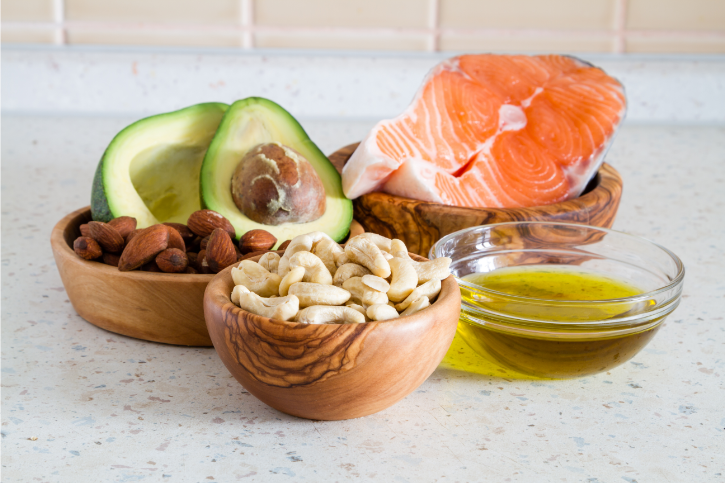
September 06, 2022 3 min read
Fats are a big part of our daily diet. They are found in foods like red meat, butter, whole milk dairy products, cooking oils, eggs, and many more.
While most fats are considered unhealthy and something to avoid, not all fats are the same. Some fats are essential fatty acids, we need to consume these because our body can not make it for us.
It is important to learn what fats you need to be consuming and which you should avoid.
Unhealthy Fats
Saturated fats and trans fats are harmful types of fat.
Trans fat raises LDL cholesterol, creates inflammation, and can cause heart disease, diabetes, and strokes. It is often found in fried food, refrigerated biscuits, frozen pizza, and margarine.
Saturated fat is an in between fat. Its not as unhealthy as trans fat, but can be very harmful if overconsumed. Like trans fat, it also increases LDL cholesterol, increasing risk of heart disease and stroke. It is found in red meat, whole milk, coconut oil, and cheese.
These fats bring no nutritional value and cause harmful side effects.
Healthy Fats
Polyunsaturated and monounsaturated fats are very nutritious fats. They are exceptionally better for you than saturated and trans fats.
Polyunsaturated and monounsaturated fats are liquid when at room temperature, whereas trans fats and saturated fats are solid.
Polyunsaturated fats
Polyunsaturated fats are essential fats that are needed for everyday function.
The two main types of polyunsaturated fats are omega 3 and omega 6 fatty acids.
Omega 3
Omega 3 provides energy and can help with focus and overall brain function. It is an anti-inflammatory, meaning it can reduce chronic inflammation that leads to illness and disease.
Omega 3 acids are also good for your joints. It has been known to help with join pain and supports overall bone health by supplying them with calcium.
Omega 3 is comprised of three types of fatty acids: docosahexaenoic, alpha-linolenic, and eicosapentaenoic.
High amounts of omega 3 are found in foods like salmon, mackerel, flaxseed, chia seeds, avocados, and soybeans.

Omega 6
There are four types of Omega 6 fatty acids: linoleic, gamma linoleic, conjugated linoleic, and arachidonic.
Some foods rich in omega 6 are chicken, fish, eggs, walnuts, avocados, sunflower seeds, safflower oil, soybean oil, sesame oil, and sunflower oil.
It is good for brain function, lowers LDL cholesterol, reducing chances of heart disease or stroke, and lowers triglycerides which are a harmful type of fat.

Monounsaturated fats
Monounsaturated fats help in the production of healthy cells. They reduce the risk of heart disease and stroke.
They provide lots of vitamin E, a fat-soluble antioxidant. Vitamin E helps neutralize free-radicals to prevent them from harming healthy cells.
Foods high in monounsaturated fats:
Monounsaturated fats lowers LDL cholesterol which also lowers the risk of heart disease and stroke.
Not only does monounsaturated fat lower LDL (low-density lipoprotein) cholesterol, but it also raises HDL (high-density lipoprotein) cholesterol. HDL cholesterol is the good kind of cholesterol as it helps get rid of excess amounts of cholesterol that may otherwise build up in the arteries and block blood flow to the heart.
❤ Try our USDA certified organic products ❤
Related Blogs:
Thanks for reading this Be Still Farms Blog article. To sign up for more news/articles and/or recipes, click here. For more about us, click here. To shop our certified organic products, click here.
Please comment and share and we look forward to serving you in the future!
Comments will be approved before showing up.

January 27, 2025 3 min read
Flaxseed, the tiny yet powerful superfood, is packed with nutrients that can support weight loss. From curbing hunger to stabilizing blood sugar, this guide dives into the science of how flaxseed can help you shed those extra pounds.

December 11, 2024 3 min read
Discover three quick and easy soup recipes featuring organic small red beans. From a classic vegetable soup to a creamy potato blend, these wholesome recipes are perfect for chilly days and busy weeknights. Packed with flavor and nutrition, these soups will warm your heart and soul this winter!

December 06, 2024 3 min read
This vibrant and nutritious Green Lentil Salad combines tender lentils with grilled chicken, fresh vegetables, and a zesty lemon dressing. Packed with protein, fiber, and essential vitamins, it’s the perfect healthy meal for any time of day.
© 2025 Be Still Farms- Real, Fine Organics.
Privacy | Terms | Refund Policy | Organic Certification
